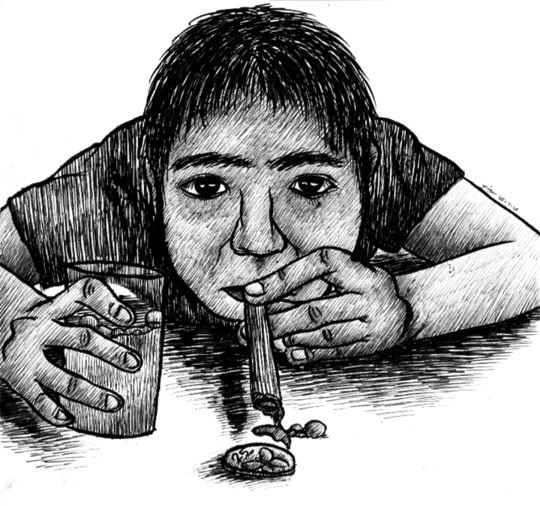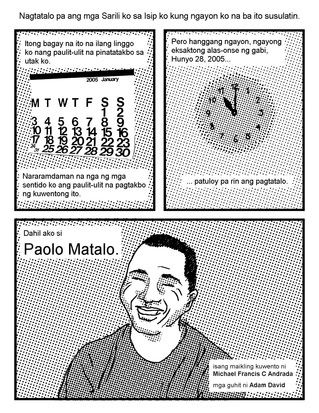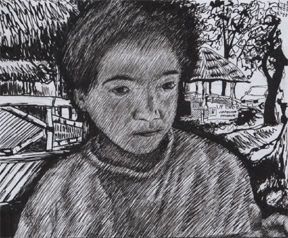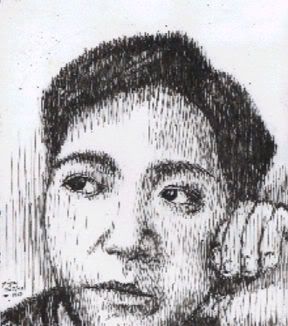ANG PAGSULPOT NG VIRGIN COLA SA PILIPINASni Michael Francis C. Andrada Ang karanasang pangkultura at pangrelihiyon ng mga Pilipino hinggil sa Marianismo (pamumuhay ayon sa ehemplo ng Birheng Maria ng mga Katoliko) ay isa sa may pinakamatinding impluwensiya sa konsepto ng pagkababae sa Pilipinas. Noong panahon ng Kolonyalismong Kastila, ang estatwa ng Birheng Maria ay isa sa mga simbolo ng bagong relihiyon ng mga katutubong Pilipino. Ibinibigay ito ng mga misyonero bilang pabuya sa mga baranggay at distritong nagpabautismo sa Katolisismo. (Mojares) Malaki ang implikasyon ng Marianismo sa paghulma sa pag-uugali’t gawi ng mga babae – na dapat gawin nila ang lahat ng makakaya upang maging kawangis ng Birheng Maria: madasalin, mahinhin, masunurin sa utos ng Diyos, at higit sa lahat, pinagkakaingatan-ingatan ang “puri” o pinananatili ang pagiging “birhen” hangga’t mabasbasan ng Katolikong kasal.
Sa panahon ng globalisasyon at kulturang popular, mamamasdan at mararamdaman ang pagbabago sa konsepto ng “babaeng birhen.” Pinakamalinaw ito sa konsepto ng babae at ng birhen sa softdrinks na Virgin Cola at iba pang produkto ng transnasyunal na korporasyong Virgin Drinks Group ni Richard Branson. Unti-unti na nating tinatangkilik sa Pilipinas ang Virgin Cola – ang ngayo’y pinakamurang softdrinks sa bansa sa halagang P5.50. Ngunit bukod sa mababang presyo, kapansin-pansin ang hitsura ng basyo (bote man o plastik) ng Virgin Cola. Kung dati’y isang estatwa ng babaeng banal, birhen at balot na balot ang dinala sa Pilipinas, ngayon ay isang boteng hubad at seksi ang ginagawang simbolo ng bagong babae sa bansa.
Ang Mahal na Birheng GlobalSa pagtuturo ko ng Kulturang Popular sa Unibersidad ng Pilipinas-Diliman, ang isa sa unang ipinagagawa ko ay ang pagtukoy sa ideolohiya ng isang nilalang. Nililinaw ko munang mabuti kung ano ang depinisyon ng ideolohiya – na ito ay isang grupo ng mga ideya, kaisipan at paniniwala na siyang humuhulma sa at nagiging kamalayan ng tao (Williams). Mas lilinawin ko pang mabuti ito sa pamamagitan ng pagsambit na ang isang tao’y maaaring malay o di-malay na nagtataglay ng isa o higit pang ideolohiya – ito man ay tama o lisya (mali). Sa kasalukuyang panahon ng kulturang popular, ang mga lisyang kamalayan ay ipinalalaganap sa pamamagitan ng mga tradisyunal na institusyong ideolohikal tulad ng pamilya, simbahan at paaralan, at sa pamamagitan ng mga ahente ng kulturang popular tulad ng pelikula, radyo, telebisyon, diyaryo at iba pang midya.
Ang pinakamatingkad na lisyang ideolohiyang taglay, malay man o hindi, ng isang tao ay ang ideolohiyang patriarkal. Isa itong sistema kung saan naghahari ang lalaki at namamayani ang kaisipang maka-lalaki. Ibig sabihin, kahit hindi kasariang lalaki ang pinakamarami sa isang lipunan, ang kaisipang maka-lalaki pa rin ang nananaig sa halos lahat ng aspeto ng pamumuhay at kultura. Nangangahulugan rin itong maging ang isang babae, lesbiyana o bakla ay maaaring malay o di-malay na nagtataglay ng ideolohiyang patriarkal. Halimbawa, sa isang lipunang patriarkal, iginigiit sa kamalayan ng mamamayan na ang sukatan ng pagkalalaki ay ang pagiging matikas, malakas at matinik sa babae, samantalang ang pagkababae nama’y nakakahon sa pagiging masunurin, mahinhin at isinusuko lang ang kanyang “puri” o “kabirhenan (virginity)” matapos ang kasal. Gayundin, maraming tao sa anumang antas ng lipunan ay naniniwalang ang anak na babae ay dapat palakihin upang maging taumbahay, samantalang ang anak na lalaki ay dapat magpursigi upang maging tagapagtaguyod ng pamilya.
Ang nakasanayang dibisyong ito ay tinatawag na “sexual division of labor” (Engels) kung saan ang babae ay itinatalaga sa isang domestikadong lugar upang punan ang “mas madaling” trabaho samantalang ang lalaki naman ang siyang susuong sa “mas mahirap” na trabahong nangangailangan ng pisikal na kalakasan. Sa puntong ito, ang dibisyon ay nagbibigay ng mas mataas na lugar sa lalaki bilang tagapag-uwi ng kita. Samakatwid, ang lalaki ang itinatanghal bilang siyang bumubuhay sa pamilya, ang pinakamaliit na pang-ekonomiyang yunit sa lipunan.
Ngunit mapapansin rin na sa kasalukuyan, habang patuloy na tumitindi ang krisis pang-ekonomiya sa pandaigdigang saklaw, ang mga babae ay pinag-uuwi na rin ng kita hindi lamang dahil sa mga panawagan para sa pantay-pantay na karapatan ng lalaki at babae kundi lalo’t higit dahil sa krisis-pinansiyal. Ngunit hindi ito nangangahulugan na pagdating sa mga opisina at pabrika ay tumitigil na ang sekswal na dibisyon ng pagtatrabaho.
Sa katunayan, habang mas pinananaig ang sistema ng globalisasyon, pinalalawak pang lalo ang sistemang patriarkal sa global na antas. Makikita ito sa feminisasyon ng paggawa – ang parami nang paraming bilang ng kababaihang pumapasok sa sektor ng paggawa. Gayundin, sa global na lebel, mayroong tinatawag na “globalisasyon ng domestikong serbisyo” (Lutz) kung saan ang kababaihan mula sa mahihirap na bansang tulad ng Pilipinas ay nagtutungo sa mayayamang bansa (Amerika, Japan, Italy, Canada atbp) upang magsilbing domestic helper. Nagiging ekstensyon ito ng domestikong pagganap ng kababaihan sa globalisadong lebel.
Ang Pagsulpot ng Mahal na Birhen ni Branson sa CabuyaoSa kulturang popular naman, makikitang tumitindi rin ang feminisasyon bilang isang galamay ng sistemang patriarkal. Makikita ito sa Virgin Cola kung saan makikitang feminisado ang paggawa at globalisado ang babae bilang pangunahing produkto ng mga mulitnasyunal at transnasyunal na korporasyon.
Nasa Cabuyao, Laguna ang 100-ektaryang planta ng Asia Brewery, Inc. (AB), kung saan ginagawa ang iba’t ibang variants ng Virgin softdrinks sa Pilipinas. Bahagi ang AB ng pag-aari ni Lucio Tan, isa sa pinakamalaking business tycoon sa Pilipinas. Humigit-kumulang P1-bilyong piso ang ipinuhunan ni Tan upang makuha ang lisensiya ng pagmamanupaktura ng mga produkto ng Virgin: Red (Cola), White (Diet), Juicy Orange (Orange) at Blue (Lemon Lime).
Bukod sa murang halaga at baryasyon ng softdrinks, isa sa pang-akit ng Virgin ang naglalakihang mga billboard na patalastas nito. Sa Cabuyao, makikita ang patalastas ng Virgin na nagsasabing: “Hot? Get a Virgin.” Mayroon itong bersyon sa Filipino: “Hot ka ba? May Virgin dito.” Sa literal na lebel, ang naturang advertising catchphrase ay isang pagtatanong sa target na merkado: “Nauuhaw ka ba? Bumili ka ng Virgin para mapawi yan.” Tila ito isang simple at inosenteng tanong na humihikayat na bumili ng Virgin Cola. Ngunit dito na pumapasok ang usapin ng patriarkal na ideolohiya. Hindi maitatatwang nakapulupot sa patalastas na ito ang kaisipang patriarkal, kung saan ang isang softdrinks, tulad ng iba pang produkto ng konsyumeristang industriya, ay inihahalintulad sa babae. Masisilo na ang tanong na “Hot?” ay tumutukoy sa kondisyon na “tag-libog” o “nag-iinit” ang isang lalaki, at ang solusyon rito ay ang isang birheng babae na didilig o titighaw sa “uhaw.”
Sa usapin ng feminisasyon ng globalisasyon, makikita sa Virgin Cola ang pagtatakda ng malalaking korporasyon sa istandard ng katawan ng isang babae at ng mismong pagkababae. Una, ang katawan o bote ng Virgin Cola ay iwinangis sa noo’y 36-21-35 na figura ng noo’y sikat na Baywatch Babe na si Pamela Anderson. Kung kaya’t tinatawag ring “The Pammy” ang naturang softdrinks. Ayon kay Branson, “No red-blooded male will be able to resist taking the top off a Pammy and pressing his lips to its neck.” Samakatuwid, hayagang idinideklara ni Branson ang sekswal na lapit sa pagbebenta ng kaniyang softdrinks. Makikita ang deklarasyong ito bilang paglalagak sa babae sa loob ng bote ng Virgin Cola. Higit pa rito, pinagsasanib ang babae at bote bilang isang produktong bibilhin ng kalalakihan, hindi lamang sa Pilipinas kundi sa pandaigdigang saklaw.
Ikalawa, itinutulak ng korporasyon ang konsepto ng “babaeng birhen” bilang ideyal na babae. Gayundin, itinutulak ito bilang ideyal na pagnanasa ng lalaki – ang maka-“iskor” ng birhen. Masasapo ito sa billboard ad ng Virgin Cola sa C-5 Highway: “More from Virgin to Satisfy You.” Ngunit ang kapuna-puna sa naturang patalastas ay napakaliit ng salitang “from” kumpara sa iba pang mga salita kung kaya’t lumalabas na ito’y: “More Virgin to Satisfy You.” Sa mga puntong ito, iginigiit at ginagawang normatibo ang nasa ng lalaki sa birheng babae bilang daluyan ng komersyo at konsumerismo. Sa lokal at global na antas, itinatakda nito ang relasyong pangkapangyarihan sa pagitan ng lalaki at babae: ang lalaki bilang mamimili at ang babae bilang produkto.
Samakatuwid, ang konsumeristang aspekto at feminisasyon ng globalisasyon ay nagpapailanlang at nagpapamandila ng maka-lalaking industriyang siyang sumasaid, pumupuno at muling-sumasaid sa transnasyunal na babaeng bote ng Virgin Cola. At kung magpapatuloy ang ganitong sistema, hindi na nakapagtataka kung isang araw, ang estatwa ng Birheng Maria sa altar ay mapalitan ng Virgin Cola.
Sanggunian:Friedrich Engels. “The Origin of the Family.”
Helma Lutz. “At Your Service!: The Globalization of Domestic Service.”
Resil Mojares. Waiting for Mariang Makiling: Essays in Philippine Cultural History.
Raymond Williams. “Ideology.”
http://www.malaya.com.ph/dec06/busi1.htm
http://www.manilastandardonline.com:8080/mnlastd/iserver?page=goodLife03_june24_2005
http://www.virgindrinks.com/thirst/default.asp





